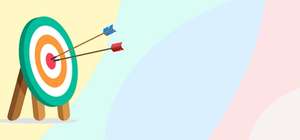
As an engineering manager, setting achievable and measurable performance goals for your engineering team is one of the most impactful steps that you can take when it comes to improving your team's performance.
However, setting goals for your development team that will actually encourage improvement isn't as simple as choosing goals at random. If you want your team members to grow and evolve from striving toward the personal goals that you provide, you need to put some thought into the goals that you set.
✅ Get new insights on managing teams and improving as a leader every week.
🚀 Join the Lead Time Newsletter
To help you start providing your engineering team with development goals to sharpen their skills and performance, we'll discuss how to set goals using the proven SMART goals framework, then jump into 10 helpful examples of engineering performance goals.
The value of engineering performance goals
Setting ambitious goals and milestones for your team members that are challenging — yet achievable — is something that offers a number of substantial benefits. For one, providing your team members with performance goals can help them hone their skills and abilities. It's easy to become complacent when you don't have a clear objective to strive toward, and complacency does not breed improvement. By providing your team members with development goals, you can ensure that they are always working to sharpen their engineering skills.
Setting challenging and achievable goals can also help your team members build confidence, since nothing builds confidence quite like overcoming a difficult challenge. And when your team members are confident in taking on difficult tasks, their performance is sure to improve.
Looking for goal tracking software? Here's our comparison list. 🏆
Setting the right goals can help you create a more unified and satisfied team.
When team members understand the specific goals that they are working toward (and how reaching those goals will help move the company forward), they feel much more connected to the bigger picture.
They’re able to draw direct connections between their daily or weekly efforts and key outcomes at a higher level. This leads to more unified and motivated team members who understand the importance of their contributions.
What are SMART goals for engineers?
Created in 1981, the SMART goals framework has long been considered one of the most effective, beneficial templates for setting goals. The SMART goals framework can be applied to both short-term and long-term business goals. Setting goals using the SMART goals framework is best explained by looking at the meaning of the SMART acronym:
- Specific: The first qualification of SMART goals is that they need to be specific and well-defined. If your team members don't actually understand the goal they are working toward, they aren't likely to yield high-performing outcomes.
- Measurable: The second qualification of a SMART goal is that it needs to be easily measurable via KPIs, key results, or other metrics. Ensuring that the goals you give your team are measurable means that you will be able to evaluate their progress toward those goals in a performance review.
- Achievable: Ambitious goals certainly have their place in the workplace, but it’s equally important for goals to be achievable. If the goals you set are too difficult or impossible to achieve, you risk frustrating and discouraging your team.
- Relevant: You don't want to set goals just for the sake of setting them. Instead, the goals you set need to be relevant to the overall goals of your business, and achieving the goals you set should actually yield positive outcomes.
- Time-bound: If someone is given an unlimited amount of time to reach a goal then it's not really a goal at all. For this reason, the final qualification of SMART goals is that they need to be bound to a specific time frame.
By setting goals that meet all of these qualifications, you can make sure that the goals you are providing to your engineering team are carefully designed to help them grow their skills and advance the company forward.
How should goals be set?
The SMART goals framework is a great place to start the process, but it's not the only element of goal-setting that needs to be addressed. For one, it's important to define who is responsible for setting goals for your team.
As their manager, you may choose to decide which goals to set completely on your own. However, it can also be beneficial to involve your team in the goal-setting and allow them input on the goals they would like to pursue.
It’s also essential to ensure that you’re setting and updating goals regularly as business needs and priorities change. In fact, according to data from Forbes, companies that set performance goals every quarter see 31% greater returns from their performance process than companies that only set performance goals annually.
Once you have set goals for your team, the next step is to track your team's progress and evaluate their results. This is why it’s essential to choose measurable goals complete with performance indicators that you can use to track your team's progress.
Goal tracking software like the one offered by Range can make this process easier.
You get a bird’s-eye view of all of your team’s goals so you can see progress at a glance.
Similarly, you can see if goals are not being met and can easily modify them if needed. Using software that ties in your entire team is beneficial, as it’s an easy way to keep everyone on the same page — whether you’re in the office or working remotely and communicating asynchronously.
Engineering performance goals: 10 examples to build stronger teams
Choosing the right engineering goals for your team is a task that is typically easier said than done. By applying the SMART goals framework to these ten engineering performance goal examples, though, you should be well on your way to selecting goals that will actually help your team achieve key results.
1. Coding
Coding is at the heart of just about everything a software development team does, and is by far one of the most important skills for your team members to hone. As a result, goals designed to improve your team's coding skills are some of the most beneficial goals that you can set. Examples of coding goals include:
- Add a new feature to an app or software solution within the next month
- Improve the load time of an app by two seconds within the next week
You can even take your coding goals a step further by breaking them down into goals that focus on quality or ownership:
Code quality
Code quality refers to the prevalence of bugs in code and its overall performance and quality. An example of a code quality goal would be instructing your team to reduce the number of bugs detected within an app by 5% within the next two weeks.
Code ownership
Code ownership refers to a single team member being responsible for every aspect of a codebase. An example of a code ownership goal would be instructing a single team member to complete an entire codebase within a month.
2. Technical skills
In addition to coding, there are several other technical skills that an engineer needs to master, including data structures and algorithms, networking basics, testing, and encryption. A technical skills goal, therefore, can be any goal meant to help your team hone their technical skills. Examples of technical skills goals include:
- Encrypt and secure a database to the point that it’s able to survive penetration testing within the next month
- Engineer a machine learning project from start to finish within the year
- Organize raw data into a functional database within a week
3. System design
System design is an overarching principle that requires plenty of coding and technical skills. System design goals are typically related to large-scope achievements that impact an entire product or system. Examples of system design goals include:
Redesign a software application within the next month in order to achieve a faster time to market
- Add a list of new integrations to an application within the next year
4. Testing
Software testing is a vital step in the development process, ensuring that teams find and address any serious bugs within the software before it’s released to its end users. From ensuring proper test coverage to performing unit tests on individual units of code, there are several key skills that go into making an engineer talented at testing code. Examples of testing goals designed to help engineers improve their testing abilities include:
- Learn a new programming language within the next quarter so that they are able to utilize additional testing avenues
- Identify the source of an error in a program within the next month
5. Debugging
Once thorough testing has identified a program's bugs, fixing those bugs through debugging is the next step. However, debugging is a skill all its own and is something that can lead to additional problems if not performed correctly. Examples of professional goals designed to help engineers improve their debugging skills include:
- Resolve all of the bugs discovered in an application within the next month
- Fix enough bugs to improve user engagement by 25% within the next quarter
6. Personal
In addition to goals designed to help the company, a good software engineer needs to have their own goals as well. Setting personal goals for individual members of your engineering team is a great way to motivate team members to improve their personal skills and performance. Examples of personal goals for software developers include:
- Learn a new programming language within the next two months
- Mentor a new engineering team member to the point that they are comfortable working on their own within a month
- Fix four medium-level bugs this quarter
7. Team management
Good teamwork capabilities and team management skills are important qualities for software engineers. Team management skills are especially essential for your senior-level engineers who will be tasked with leading various team projects. Examples of goals designed to help engineers improve their team management skills include:
- Recruit a new member to your engineering team and train them to the point that their performance is satisfactory within the next three months
- Delegate project tasks among team members
- Lead a project for the first time, successfully
8. Team synergy
Team management is important for the senior-level engineers who will be leading teams and projects, but good team synergy is vital for every member of your engineering team. Examples of goals that are meant to help an engineering team build better synergy include goals such as:
- Complete team-building exercises with satisfactory outcomes
- Work together to complete PERT or GANTT charts so that everyone's role is carefully defined
9. Networking
The right connections can offer a lot of value to a software development team, helping them form strategic partnerships and serving as outside sources of guidance. This makes goals designed to help your team expand their professional network highly beneficial. Examples of networking goals meant to grow an engineer's professional connections include:
- Schedule lunch with a senior-level engineer from another team at least once every month
- Attend a networking conference with the goal of securing at least one new connection per team member
10. Professional development
Professional development refers to the development of soft skills such as time-management skills, problem-solving, and communication. Examples of goals designed to help engineers bolster their professional development include goals such as:
- Master the lean development methodology in order to eliminate common development challenges
- Complete a project in 24 fewer hours than it took to complete a similar project in the past
The benefits of engineering performance goals
The benefits of setting good performance goals for your engineering team are multi-faceted. For one, all of the goals we've listed above are designed to help engineers improve specific skills that will make them more valuable members of your team and company.
Next, meeting performance goals is also something that can grow a team member's confidence and assure them that they are ready to take on more demanding responsibilities.
Finally, setting goals for your team is one of the best ways to track the performance of individual team members and gauge who is ready for additional responsibilities/promotions.
Improve engineering team goals with Range
Setting beneficial goals is one of the most helpful things you can do as an engineering team leader. However, goal-setting is only one element of good team management.
The good news is that Range makes it easier to manage your engineering team, no matter where your team members are located.
With goals in Range, you can:
- Create accountability by sharing information and updates across the team
- Easily track how daily work connects to higher-level goals
- Set a goal for metrics, objectives, and KPIs
- With hashtags, see all artifacts, updates, and day-to-day progress in one place
- Share goal updates with leaders via Slack or email
Range offers all of the features you need to manage multiple projects handled by both remote and in-house team members in a way that is straightforward and efficient, helping you reach your goals more effectively.








